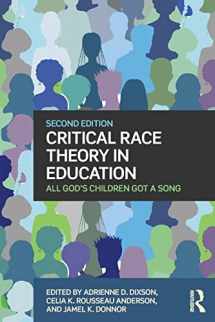
Critical Race Theory in Education: All God's Children Got a Song
Book details
Summary
Description
Appropriate for both students curious about Critical Race Theory (CRT) and established scholars, Critical Race Theory in Education is a valuable guide to how this theoretical lens can help better understand and seek solutions to educational inequity. While CRT has been established as a vital theoretical framework for understanding the ways race-neutral policies and laws sustain and promote racial inequity, questions around how to engage and use CRT remain. This second edition of Critical Race Theory in Education evaluates the role of CRT in the field of higher education, answering important questions about how we should understand and account for racial disparities in our school systems. Parts I and II trace the roots of CRT from the legal scholarship in which it originated to the educational discourse in which it now resides. A much-anticipated Part III examines contemporary issues in racial discourse and offers all-important practical methods for adopting CRT in the classroom.


We would LOVE it if you could help us and other readers by reviewing the book
Book review



